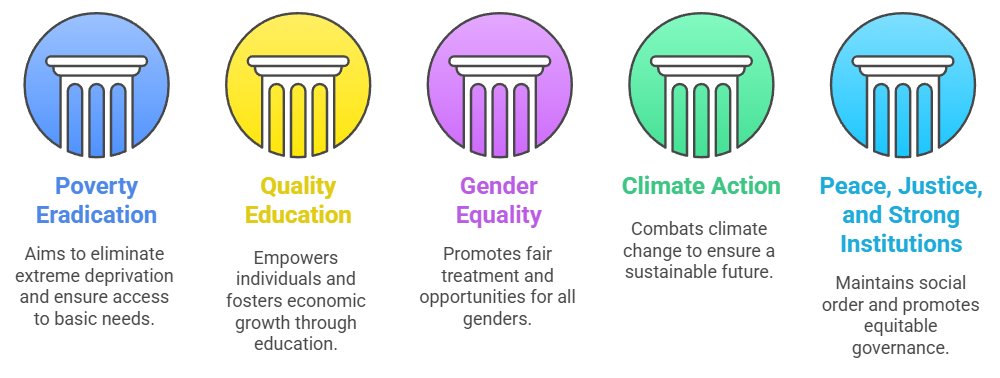
Sustainable Development Goals
This section provides a framework for understanding the Post 2015 Development Agendas.When the Millennium Development Goals (MDGs) ended in 2015, the international community came together once again, under the auspices of the United Nations, to formulate a development agenda for adoption beyond 2015.
These six agendas (which go beyond just the SDGs) together became known as the "Post-2015 Agendas"
The SDGs represent a universal call to action to end poverty, protect the planet, and ensure that all people enjoy peace and prosperity by 2030. Achieving the SDGs requires integrated efforts across social, economic, and environmental dimensions, leaving no one behind.

Main Thematic Areas:
- Poverty eradication
- Quality education
- Gender equality
- Climate action
- Peace, justice, and strong institutions

Foundations of Sustainable Development
Facts and Figures:
- Over 700 million people still live in extreme poverty (less than $2.15 a day, 2023 World Bank data).
- SDG 4 aims for all youth and a substantial proportion of adults to achieve literacy and numeracy by 2030.
- Women represent 70% of the world's health and social care workforce but often face pay gaps (WHO, 2021).
- The world is on track for a 2.8 <C temperature rise by 2100 if current pledges are not strengthened (UNEP, 2023).
- 1 in 4 people globally are affected by conflict or violence (UNDP, 2023).
- 2030 Agenda for Sustainable Development: Adopted by all UN Member States in 2015, this document provides the overarching framework that integrates 17 goals and 169 targets to guide global development efforts through 2030.
- Voluntary National Reviews (VNRs): Countries voluntarily submit reports to the UN detailing their progress, challenges, and best practices in implementing the SDGs, fostering transparency and peer learning.
- UN High-level Political Forum (HLPF): This is the central UN platform for the follow-up and review of the SDGs, convening annually to assess global progress and strengthen political leadership on sustainable development.
- Global Sustainable Development Report (GSDR): An evidence-based, UN-commissioned report prepared every four years t
- provide science-based recommendations and promote integrated approaches to achieving the SDGs.
- 2030 Agenda for Sustainable Development
- Voluntary National Reviews (VNRs)
- UN High-level Political Forum (HLPF)
- Global Sustainable Development Report (GSDR)
UN Focal Agency:
Case Studies
| BRAC (Bangladesh): BRAC implements integrated rural development programs that directly advance SDG 1 (No Poverty) and SDG 4 (Quality Education) by combining microfinance, health, and education services in remote communities. | Project Everyone (Global): Founded by filmmaker Richard Curtis, Project Everyone uses media campaigns to raise public awareness about the SDGs, translating complex targets into accessible and actionable goals for global citizens. | Restless Development (Africa and Asia): This youth-led NGO mobilizes young people to lead community monitoring of SDG progress, particularly in education, gender equality, and employment, through training and advocacy |
| Aflatoun International (Global): Aflatoun promotes social and financial education for children and youth through school-based programs, contributing directly to SDG 4 (Quality Education) and SDG 8 (Decent Work and Economic Growth). | SEWA (India): The Self-Employed Womenfs Association empowers informal women workers through micro-enterprises, health care, and training, addressing SDGs on gender equality, poverty, and decent work. | Young African Leaders Initiative (Africa): Supported by the U.S. government, YALI equips young professionals with leadership and entrepreneurship skills, supporting SDG 4 and SDG 16 through inclusive civic engagement. |